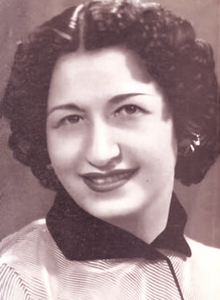Iraqi Women's Union
From the beginning of the British occupation, through the mandate period, and up into the era of Iraqi independence (both pre- and post-revolution), women had become a notable political force.
[4] The IWU was founded as an umbrella organization to coordinate the activities of existing women's groups in Iraq, emerging out of the Arab Feminist Union conference of December 1944.
The union was a coalition to support and coordinate cooperation across existing women's associations in Iraq, with the aim of raising their social, civil, and economic position, as well as improving their health and legal status.
[2] While the latter became a distinctly underground organization, the former continued to work within the status quo political order and enjoyed support from the government and royal family.
Notably, the organization offered special lectures, films, plays, aided in natural disaster relief and supported women's political participation.
Clinics opened by the IWU provided fresh milk, fish oil, and clothing for babies and inoculated children against typhoid and smallpox.
The society subsequently developed several other programs for urban mothers and children in Baghdad and in 1953, over 4,500 homes were reached by staff of the IWU's clinics who offered lessons on childhood nutrition and breastfeeding.
Though the organization offered tangible support to the promotion of women's issues in mid-Century Iraq, scholars debate the extent to which the IWU was impactful compared to their underground counterparts.
The IWU falls into the former category, with counterpart organizations like League for the Defense of Women's Rights (Rabita al-Difa an Huquq al-Mara) better reflecting activism that was more likely to earn the ire of the ruling regime.
[4] The Personal Status Code of 1959 passed by the former ruler of Iraq, Abd al-Karim Qasim, ensured women's equality in polygamy, inheritance, marriage consent, and divorce.
The progress embodied in the passage of the Status Code is largely attributed to political organizations under the auspices of the IWU which campaigned for women's rights.
[5] Her written work detailed that Iraq's modernization would be reliant on the presence of socially and economically aware Iraqi women who could be able to identify themselves as part of the national project.

